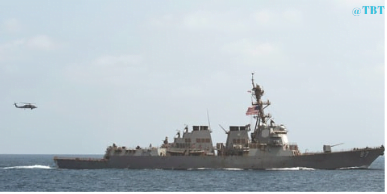The simmering conflict in Yemen was stressed over this week as the United States and the United Kingdom launched airstrikes on Houthi rebel targets in response to a series of attacks on commercial ships in the Red Sea, Washington and London. These airstrikes, marking a significant escalation in the long-running civil war, raise concerns about increased regional instability and a potential humanitarian crisis.
The past few weeks have seen a worrying rise in Houthi attacks on vessels traversing the crucial Red Sea shipping lane. Tankers carrying oil and other vital goods were targeted with drone strikes and missiles, disrupting international trade and raising fears of wider disruption. These attacks, reportedly conducted in retaliation for Saudi-led coalition airstrikes, threatened the free flow of commerce through this vital artery.
The US president, Joe Biden said that “ American and British forces, with support from Australia, Bahrain, Canada, and the Netherlands, were involved in the attack, striking at least 60 targets in 16 locations around Yemen.” Biden also said: “These strikes are in direct response to unprecedented Houthi attacks against international maritime vessels in the Red Sea – including the use of anti-ship ballistic missiles for the first time in history.“These attacks have endangered US personnel, civilian mariners, and our partners, jeopardised trade, and threatened freedom of navigation.”
Targets of the incidents included “radar systems, air defense systems, and storage and launch sites for one-way attack unmanned aerial systems, cruise missiles, and ballistic missiles.” The attacks took place in Yemen at around three in the morning.
Decisive Response & Delicate Balance strategy
The US and UK, with significant naval patrols in the region, didn’t waste time in retaliating. Precision airstrikes targeted infrastructure used by the Houthis to launch their attacks, including drone and missile storage facilities, radar installations, and command centers. Both countries emphasized that their actions were “proportionate” and aimed at deterring further attacks on shipping.
While the airstrikes send a clear message of deterrence, the risks of further escalation are high. The Houthi rebels, backed by Iran, have threatened retaliation, raising concerns about potential attacks on American and British interests in the region. Additionally, the airstrikes could complicate the already fragile cease-fire between the Houthis and the Saudi-led coalition, jeopardizing peace efforts and risking renewed war.
The Red Sea’s strategic location, connecting Europe with Asia and Africa, makes it a vital artery for world trade. Any disruption to its flow has severe economic repercussions, impacting energy prices and the global supply chain. Moreover, the conflict in Yemen casts a long shadow, with wider geopolitical implications due to the involvement of regional powers and potential for spillover effects.
Effects of this airstrike
The immediate question hangs heavy: Will these airstrikes serve as a deterrent or ignite a fiercer conflict? The international community must step up its diplomatic efforts to de-escalate the situation and prevent a humanitarian catastrophe. Finding a lasting solution to the Yemeni conflict, addressing the legitimate grievances of all parties, remains the key to restoring peace and stability in the region.









